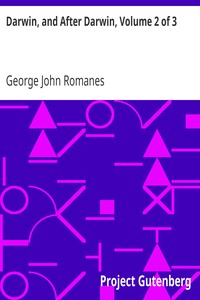Darwin, and After Darwin, Volume 2 of 3 by George John Romanes
"Darwin, and After Darwin, Volume 2" by George John Romanes is a scientific publication written in the late 19th century. The book is focused on exploring post-Darwinian questions, particularly those concerning heredity and utility, and aims to examine significant theories that have emerged following Darwin's foundational work in evolutionary biology. In this volume, the author engages with key debates in the scientific community at the turn of the century regarding the mechanisms
of evolution, particularly emphasizing the inheritance of acquired traits versus the established principles of natural selection. The opening of the text lays the groundwork for these discussions by situating Darwin's original theories against the backdrop of emerging post-Darwinian thought. Romanes begins by outlining Darwin’s contributions to evolutionary theory, particularly his insistence that natural selection is not the sole mechanism of evolution. He introduces the perspectives of prominent contemporaries, including Alfred Russel Wallace and August Weismann, who argue for different interpretations of natural selection and inheritance. Romanes acknowledges the complexities and controversies surrounding these theories and sets up a framework for a thorough investigation into the principles of heredity and utility, inviting readers to navigate through intricate debates that shaped the understanding of evolution in the scientific community. (This is an automatically generated summary.)
Read or download for free
| How to read | Url | Size | |||
|---|---|---|---|---|---|
| Read now! | https://www.gutenberg.org/ebooks/37759.html.images | 753 kB | |||
| EPUB3 (E-readers incl. Send-to-Kindle) | https://www.gutenberg.org/ebooks/37759.epub3.images | 619 kB | |||
| EPUB (older E-readers) | https://www.gutenberg.org/ebooks/37759.epub.images | 626 kB | |||
| EPUB (no images, older E-readers) | https://www.gutenberg.org/ebooks/37759.epub.noimages | 318 kB | |||
| Kindle | https://www.gutenberg.org/ebooks/37759.kf8.images | 929 kB | |||
| older Kindles | https://www.gutenberg.org/ebooks/37759.kindle.images | 861 kB | |||
| Plain Text UTF-8 | https://www.gutenberg.org/ebooks/37759.txt.utf-8 | 635 kB | |||
| Download HTML (zip) | https://www.gutenberg.org/cache/epub/37759/pg37759-h.zip | 598 kB | |||
| There may be more files related to this item. | |||||
Similar Books
About this eBook
| Author | Romanes, George John, 1848-1894 |
|---|---|
| Title |
Darwin, and After Darwin, Volume 2 of 3 Post-Darwinian Questions: Heredity and Utility |
| Credits | E-text prepared by Marilynda Fraser-Cunliffe, L. N. Yaddanapudi, |
| Reading Level | Reading ease score: 43.9 (College-level). Difficult to read. |
| Language | English |
| LoC Class | QH: Science: Natural history |
| Subject | Evolution (Biology) |
| Subject | Heredity |
| Category | Text |
| EBook-No. | 37759 |
| Release Date | Oct 15, 2011 |
| Copyright Status | Public domain in the USA. |
| Downloads | 323 downloads in the last 30 days. |
| Project Gutenberg eBooks are always free! | |

